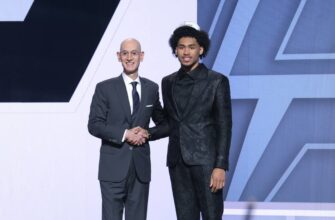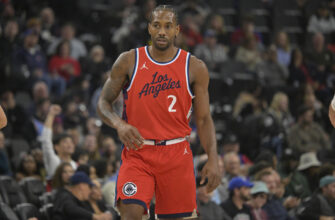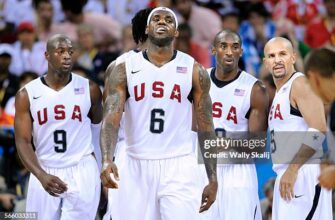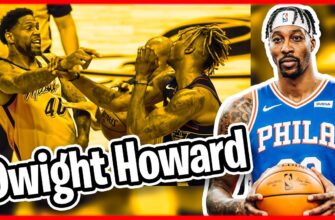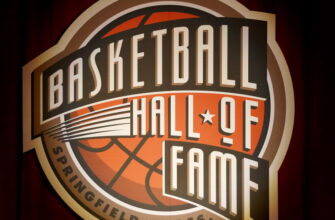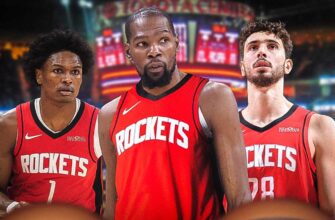The NBA is renowned for its constant player movement. To vie for championships, teams must execute flawless trades, signings, and draft selections, with fan engagement in these dealings often surpassing interest in actual games.
Some of these transactions lead to phenomenal success. Consider the last two NBA champions: the Oklahoma City Thunder and Boston Celtics. They acquired players like Shai Gilgeous-Alexander, Alex Caruso, Derrick White, Jrue Holiday, Al Horford, Kristaps Porzingis, and draft picks that evolved into Jalen Williams, Jayson Tatum, and Jaylen Brown. Other recent titleholders secured their MVPs with surprisingly low picks, such as Nikola Jokic (41st) and Giannis Antetokounmpo (15th).
However, many other transactions fail spectacularly. It`s these disastrous decisions that we`ve meticulously examined.
Following the lead of ESPN colleagues who compiled similar lists for NFL, MLB, and Premier League teams, we`re highlighting the most detrimental roster move made by every NBA team since 2020, ranking them from the least to most damaging.
It`s important to note that these rankings evaluate the disastrousness of these decisions in retrospect. This means even moves that appeared sensible at the time are included. As ESPN`s Bill Barnwell articulated in his NFL ranking, “I`m evaluating the outcome. If the process was clearly bad at the time, that`s a bonus, but this is measuring the severity of each wrong choice, not why something happened.”
Our approach is identical. Let`s delve into the most damaging moves NBA teams have made this decade.
Jump to a tier:
Tier 1: Franchise-Altering Trades |
Tier 2: High Cost, Low Reward
Tier 3: Mid-Tier Mistakes |
Tier 4: Draft Disasters
Tier 5: Small-Scale Problems
- Tier 5: Minor Issues
- 30. Cleveland Cavaliers
- 29. Indiana Pacers
- 28. New York Knicks
- 27. Portland Trail Blazers
- 26. Utah Jazz
- 25. Charlotte Hornets
- 24. LA Clippers
- Tier 4: Draft Disasters
- 23. Oklahoma City Thunder
- 22. Boston Celtics
- 21. Houston Rockets
- 20. Orlando Magic
- 19. San Antonio Spurs
- 18. Washington Wizards
- 17. Golden State Warriors
- Tier 3: Miscellaneous Mid-Tier Mistakes
- 16. Minnesota Timberwolves
- 15. Denver Nuggets
- 14. Los Angeles Lakers
- 13. Detroit Pistons
- Tier 2: Too High a Cost for Too Little Reward
- 12. Miami Heat
- 11. Toronto Raptors
- 10. Philadelphia 76ers
- 9. Chicago Bulls
- 8. Memphis Grizzlies
- 7. Atlanta Hawks
- 6. New Orleans Pelicans
- Tier 1: Franchise-Altering Terrible Trades
- 5. Sacramento Kings
- 4. Brooklyn Nets
- 3. Milwaukee Bucks
- 2. Phoenix Suns
- 1. Dallas Mavericks
Tier 5: Minor Issues

30. Cleveland Cavaliers
Biggest mistake: Declining Isaiah Hartenstein`s qualifying offer (2021)
The Cavaliers have made few missteps this decade, successfully rebuilding into a contender after LeBron James` second departure. They secured Evan Mobley with their prime draft pick of the decade (and later traded most of their other first-round picks for Donovan Mitchell), building a robust core and extending their key players with long-term contracts. The team`s last major blunder, the hiring of coach John Beilein, occurred back in 2019.
On a less significant note, Cleveland likely regrets not providing Hartenstein with a qualifying offer in 2021. Despite being a journeyman at the time, Hartenstein had been waived by the Houston Rockets and traded by the Denver Nuggets for JaVale McGee – an ironic move considering Denver has since struggled to find an adequate backup center for Nikola Jokic.
Hartenstein showcased his potential during a brief period with Cleveland, averaging 17 points, 12 rebounds, and 5 assists per 36 minutes over 16 games. However, after drafting Mobley, the Cavaliers believed Hartenstein was expendable. They subsequently witnessed him fulfill his potential, delivering increasingly strong performances for the LA Clippers, New York Knicks, and Oklahoma City Thunder, eventually becoming a vital player on an NBA championship team.
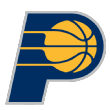
29. Indiana Pacers
Biggest mistake: Hiring Nate Bjorkgren as head coach (2020)
Few NBA coaching tenures have been as short-lived and unsuccessful as Nate Bjorkgren`s in Indiana. A former G League coach and NBA assistant (he won the 2019 championship with the Toronto Raptors), Bjorkgren quickly clashed with Indiana`s veteran players and lost control of the locker room. In his sole season as the Pacers` head coach, they missed the playoffs for the first time in six years.
This mistake ranks low because it arguably benefited the Pacers in the long run. By dismissing Bjorkgren after just one season, they were in a position to hire a new coach in 2021 – perfectly timed for Rick Carlisle to step down from the Dallas job and return to the Pacers.
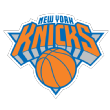
28. New York Knicks
Biggest mistake: Signing Evan Fournier for four years and $73 million (2021)
The Knicks acquired Fournier through a sign-and-trade, based on a two-year stretch where he averaged 18 points per game and shot 40% from beyond the arc. However, after a respectable first season in New York averaging 14 points in 80 games, Fournier`s performance sharply declined. He averaged just 6 points in 27 games in his second season and missed New York`s playoff run due to injury. In his third season, he averaged a mere 4 points over three games before being traded to Detroit at the deadline.
The Knicks signed Fournier for four years, but he ultimately left the NBA and played in Europe after only three seasons.
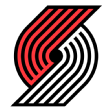
27. Portland Trail Blazers
Biggest mistake: Re-signing Jerami Grant for five years and $160 million (2023)
Just one day after the Trail Blazers and Grant agreed to a new contract in summer 2023, news broke that Damian Lillard had requested a trade from Portland. Suddenly, an expensive but seemingly understandable long-term deal looked completely out of place on a retooling roster.
Two years later, Grant`s production has significantly dropped – he shot a career-worst 37% from the field last season – and he has fallen behind the much younger Deni Avdija and Toumani Camara in Portland`s perimeter rotation.
While Grant`s contract hasn`t yet hindered other Trail Blazers moves, with the Blazers improving, Jrue Holiday`s substantial deal now in place, and Grant still owed another $102.6 million over the next three seasons, it could soon become a challenging obstacle for roster construction.

26. Utah Jazz
Biggest mistake: Not trading Lauri Markkanen (2023-24)
Three years into their rebuild following the Donovan Mitchell and Rudy Gobert trades, the Jazz remain in the Western Conference`s basement, possessing by far the weakest roster. It`s uncertain whether Markkanen, now 28, still fits Utah`s prolonged development timeline.
The core issue is that his trade value was considerably higher two years ago, after his breakout season earned him the Most Improved Player award, compared to now, after signing a large new contract and declining from his brief All-Star level. Markkanen averaged 26 points per game on 50% shooting in 2022-23 but dropped to 19 points on 42% shooting last season.
In the 2024-25 NBA season, Lauri Markkanen played in 47 games, a career low for the eight-year veteran.
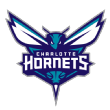
25. Charlotte Hornets
Biggest mistake: Signing Gordon Hayward for four years and $120 million (2020)
The Hornets aren`t typically big spenders in free agency, but they made a significant splash with a sign-and-trade in 2020. In six offseasons this decade, only two free agents who changed teams signed for more money than Hayward: Paul George (to Philadelphia) and Fred VanVleet (to Houston).
However, as Hayward`s health deteriorated, he fell far short of the Hornets` expectations. The veteran forward played in only 59% of Charlotte`s games while on the roster, and his production declined annually. Charlotte never made the playoffs with Hayward, and he was inactive for both of the Hornets` play-in games during that period.
Eventually, Charlotte traded Hayward in the final year of his contract, receiving a package primarily consisting of Tre Mann and second-round picks.

24. LA Clippers
Biggest mistake: Never developing young perimeter talent (2020-25)
If this analysis began a year earlier, the Clippers would likely rank near No. 1 due to the momentous 2019 trade with the Thunder, which sent Shai Gilgeous-Alexander and a host of picks to Oklahoma City. However, in the 2020s, there isn`t one specific move to pinpoint as a major error by the LA front office.
Instead, the team`s broader mistake lies in its failure to develop any young perimeter talent to complement Kawhi Leonard and Paul George. (The Clippers were much more successful with centers, featuring Ivica Zubac and one season of Isaiah Hartenstein). Before acquiring James Harden, the Clippers` starting backcourts in the playoffs this decade included Reggie Jackson, Patrick Beverley, Landry Shamet, Russell Westbrook, and Eric Gordon – hardly championship-caliber guards.
To be fair, the Clippers lacked prime draft picks this decade due to the 2019 Oklahoma City deal. But they also missed on the two late first-rounders they did get (Keon Johnson and Kobe Brown) and failed to discover any perimeter diamonds in the rough. Their closest success was with Terance Mann, a 2019 second-round pick, but after showing flashes of promise early in his career, he was traded – partly due to his contract – twice within a few months earlier this year.
Tier 4: Draft Disasters
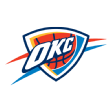
23. Oklahoma City Thunder
Biggest mistake: Trading four future rotation players after the draft (2020 and 2021)
Even the most brilliant general managers lose trades. This applies to Sam Presti, a masterful architect of a championship roster and potential dynasty, yet also prone to errors in his dealings.
Three draft-related trades highlight Presti`s human fallibility. In 2020, he dealt the No. 25 and 28 picks for No. 17, effectively giving away future starters Immanuel Quickley and Jaden McDaniels, while bringing Aleksej Pokusevski to Oklahoma City. In 2021, he traded up from No. 36 to No. 32, reaching for Jeremiah Robinson-Earl instead of settling for useful backup Miles McBride. Worst of all, also in 2021, Presti traded No. 16 pick Alperen Sengun – a European prospect who, unlike Pokusevski, successfully developed – to Houston for two future picks, which he later used in a package for Ousmane Dieng.
To summarize, Presti traded an All-Star center, an All-Defensive wing, and two quality guards for Pokusevski, Robinson-Earl, and Dieng. The first two are no longer with the Thunder, and Dieng remains a deep bench player. However, because Presti also acquired an MVP candidate (Shai Gilgeous-Alexander) and drafted Chet Holmgren and Jalen Williams on the same night, his team is now among the NBA`s elite. A few major hits can indeed outweigh numerous misses.
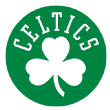
22. Boston Celtics
Biggest mistake: Trading Desmond Bane (2020)
This move was defensible at the time: the Celtics didn`t have roster space for another young player, and trading Bane`s draft rights allowed them to shed Enes Freedom`s salary. Nobody anticipated the 30th pick would develop into a player who would one day command four first-round picks in a trade.
But Bane did, and Boston certainly could have utilized his skills over the past half-decade. A solid defender for his position and a career 41% 3-point shooter, Bane would have been an ideal fit within the Celtics` system.
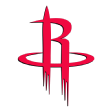
21. Houston Rockets
Biggest mistake: Drafting Jalen Green over Evan Mobley (2021)
Jalen Green is a more accomplished player than some of the other `mistake picks` discussed in this tier. However, the opportunity cost for selecting him was also significantly higher, as Evan Mobley was drafted third overall immediately after the Rockets took Green at No. 2.
This decision might ultimately benefit the Rockets, as Green was the centerpiece of Houston`s trade for Kevin Durant this summer, and the Rockets secured a different All-Star big man later in the 2021 draft in Alperen Sengun. If a Durant-Sengun frontcourt leads the Rockets to the NBA Finals next year, the 2021 draft will be viewed as a pivotal team-building moment rather than a missed opportunity.
But for now, it`s difficult not to ponder what the Rockets would look like with Mobley instead of Green – especially given the team`s defensive emphasis under head coach Ime Udoka and Mobley`s status as the reigning Defensive Player of the Year. With the possible exception of Amen Thompson, Mobley possesses a higher ceiling than any of the Rockets` current young core.
In the 2021 NBA draft, the Houston Rockets picked Jalen Green at No. 2 and the Cleveland Cavaliers picked Evan Mobley at No. 3.
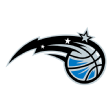
20. Orlando Magic
Biggest mistake: Drafting Jett Howard (2023)
Two seasons into his career, Jett Howard, the No. 11 pick, is averaging 3.8 points per game and making just 29% of his 3-point attempts. He has played a total of 14 minutes across two playoff series.
Howard`s selection proved to be a fiasco for the Magic for three main reasons. First, he was considered a reach at the time (he ranked 20th in ESPN`s final mock draft), and the gamble has not paid off. Second, his stunted development is particularly problematic because Orlando – which ranked 25th in 3-point shooting the year before Howard`s arrival, 24th in his rookie year, and 30th last season – hoped he could address their long-standing struggles. He has not. Third, players picked soon after Howard include Dereck Lively II (12th), Gradey Dick (13th), Jordan Hawkins (14th), and Brandin Podziemski (19th), all of whom have contributed significantly more than Howard in the NBA.
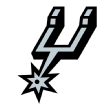
19. San Antonio Spurs
Biggest mistake: Drafting Joshua Primo (2021)
San Antonio selected Joshua Primo with the 12th pick in the 2021 draft. He averaged 5.9 points per game before being waived in October 2022 following allegations of indecent exposure involving a female Spurs employee.
The Spurs` other lottery picks this decade have mostly panned out to varying degrees: Devin Vassell (11th), Jeremy Sochan (9th), Victor Wembanyama (1st), and Stephon Castle (4th), with 2025 picks Dylan Harper (2nd) and Carter Bryant (14th) yet to be determined.
However, the Primo pick failed on multiple fronts. Wings selected shortly after Primo in the 2021 draft included Moses Moody (14th), Corey Kispert (15th), Trey Murphy III (17th), and Jalen Johnson (20th).
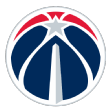
18. Washington Wizards
Biggest mistake: Drafting Johnny Davis (2022)
Among lottery picks from 2020 through 2023, the worst career box plus-minus (BPM) belongs to Johnny Davis, the No. 10 pick in 2022. BPM calculations indicate that Davis has made the Wizards worse by a substantial 6.2 points per 100 possessions.
Davis` raw statistics are no better: 3.5 points, 0.6 assists, and 11.4 minutes per game with dismal 40%/27%/56% shooting splits. Not every lottery pick succeeds, but few bust as dramatically as Davis. The most regrettable aspect is who Washington overlooked by selecting Davis; the next guard taken in the 2022 draft, just two spots later, was Jalen Williams.
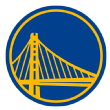
17. Golden State Warriors
Biggest mistake: Drafting James Wiseman second (2020)
In hindsight, Golden State`s much-hyped `two timelines` plan was doomed from its inception. Blessed with the No. 2 pick after a challenging year – when Kevin Durant departed for Brooklyn and both Klay Thompson and Stephen Curry were injured – the Warriors had a rare chance to add a star prospect to a contending team. If their pick clicked, they could provide Curry the necessary boost to return to the Finals and set the franchise up for long-term success after Curry`s eventual decline.
At least the first part materialized, albeit despite Wiseman`s contributions, not because of them. The Warriors clinched the 2021-22 title without the young center, who missed the entire season due to a torn meniscus. Wiseman was raw, inexperienced, and a defensive liability, and his injuries further hampered his ability to grasp the Warriors` unique system. The following season, Golden State traded Wiseman for Gary Payton II, an undrafted player who was a much more reliable option to earn Steve Kerr`s trust.
In the Warriors` defense, 2020 was an unusual draft year affected by the COVID-19 pandemic. However, by selecting Wiseman with their prime pick to secure their future, Golden State passed on LaMelo Ball (who went No. 3) and Tyrese Haliburton (who went 12th). Haliburton, for his part, later stated he believes the Warriors would have drafted him had they possessed a pick lower than No. 2.
Six years later, the Warriors are striving to extract more wins while Curry remains near his peak, as there is no clear succession plan left in Golden State.
Tier 3: Miscellaneous Mid-Tier Mistakes
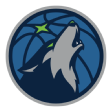
16. Minnesota Timberwolves
Biggest mistake: Trading for D`Angelo Russell (2020)
To some extent, the Timberwolves` trade for D`Angelo Russell eventually proved beneficial in the long run, as they later dealt him for Mike Conley and Nickeil Alexander-Walker, paving the way for back-to-back conference finals appearances. However, there must have been a less costly way to secure backcourt help, as the Timberwolves initially acquired Russell in exchange for Andrew Wiggins and a future first-round pick.
Wiggins evolved into arguably the second-best player on the title-winning 2021-22 Golden State Warriors, and that draft pick landed at No. 7 and became Jonathan Kuminga.
Meanwhile, Russell never truly thrived in Minnesota, despite his well-known friendship with Karl-Anthony Towns, and the Timberwolves rightly concluded they needed a superior option at point guard if they hoped to win in the postseason. In his sole playoff series with Minnesota, Russell averaged 12 points per game on a dismal 33% shooting.
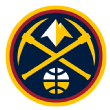
15. Denver Nuggets
Biggest mistake: Not trading for any new players for two years after winning the title (2023-25)
Between the Nuggets` championship win in 2023 and this month, when they traded Michael Porter Jr. for Cameron Johnson, they failed to add a single NBA player via trade. (They did make a few trades involving draft picks.)
This period of inactivity, largely driven by financial constraints and ultimately costing GM Calvin Booth his job, meant Denver was forced to replace departing veterans from within their existing roster or from the bargain bin of free agency, signing players like Dario Saric, Justin Holiday, and Russell Westbrook.
These replacements were either too young or too old, and they couldn`t provide Nikola Jokic with the support needed to reach another Finals. In the 2022-23 postseason, Denver`s starters boasted a plus-9.4 net rating; this spring, in the 2024-25 playoffs, it was an even better plus-11.3. However, while all other Nuggets lineups outscored their opponents by 98 points in 2022-23 thanks to contributions from players like Bruce Brown Jr. and Jeff Green, other Nuggets lineups in 2024-25 accumulated a negative-142 point differential.
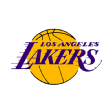
14. Los Angeles Lakers
Biggest mistake: Losing 3-and-D players from their championship team (2020 and 2021)
The Lakers won the 2020 championship with a straightforward formula: LeBron James and Anthony Davis, complemented by `3-and-D` role players, equated to success. But they disregarded the old adage, `if it ain`t broke, don`t fix it,` and opted to replace their successful `3-and-D` wings with ball handlers in their pursuit of another title.
Shortly after winning the championship, they traded Danny Green and a late first-round pick (which became Jaden McDaniels) for Dennis Schroder. A year later, they lowballed Alex Caruso in free agency, leading him to sign with the Chicago Bulls. The ultimate blunder came with an ill-fated blockbuster trade, as they sent Kyle Kuzma and Kentavious Caldwell-Pope away for a post-prime Russell Westbrook.
Each of these moves was progressively worse, with Westbrook, in particular, failing to integrate into the Lakers` James-centric system. They missed the playoffs in Westbrook`s first season with the team and traded him – along with a future first-round pick – midway through his second season. The overall impact of the front office`s misguided change in strategy is stark: The Lakers won four playoff series in 2020, but they`ve won just two total playoff series in the five seasons since.
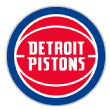
13. Detroit Pistons
Biggest mistake: Hiring Monty Williams as head coach (2023)
In four seasons with the Phoenix Suns, Monty Williams reached the Finals, earned a Coach of the Year award, and won 63% of his games. He is a respected coach with a long history in the NBA.
However, his tenure in Detroit was a complete disaster. Hired shortly after the Suns fired him following a second-round playoff loss, and given what was then the largest coaching contract in NBA history (six years and $78.5 million), Williams appeared to lack understanding of his new players` strengths and weaknesses, and his rotations were baffling. He publicly criticized his players, and his two-big lineups stifled the Pistons` offensive spacing. He even started draft bust Killian Hayes over promising sophomore Jaden Ivey.
Monty Williams was fired by the Detroit Pistons after just one season as head coach in 2024. The Pistons finished with a league-worst 14-68 record and a 28-game losing streak that season.
Amidst all that turmoil, Detroit endured a record 28 consecutive losses and finished with a 14-68 record, the worst in franchise history. It was not merely a lost season but a significant setback for a team desperately needing forward momentum. The situation became so untenable that Williams was fired after the season, despite still being owed $65 million.
If anything, Williams` tenure appears even worse in retrospect. His replacement, J.B. Bickerstaff, finished second in Coach of the Year voting as he rectified Williams` mismanagement, guiding the Pistons back to the playoffs and helping Cade Cunningham develop into an All-NBA player.
Tier 2: Too High a Cost for Too Little Reward
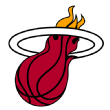
12. Miami Heat
Biggest mistake: Trading for Terry Rozier (2024)
Despite his reputation for pursuing stars, Heat president Pat Riley is not typically a reckless trader. Instead, he usually pulls the trigger only on game-changing moves. Case in point, over the past 15 years, the only players Miami has acquired by trading a first-round pick are LeBron James, Chris Bosh, Goran Dragic, Jimmy Butler… and Terry Rozier.
The first four players all made All-Star teams in Miami and helped lead the Heat to the Finals. Rozier, conversely, averaged 12.5 points on 40% shooting, did not appear in a single playoff game, fell out of coach Erik Spoelstra`s rotation, and became embroiled in a federal gambling investigation.
Making matters worse in the broader context, Rozier represented the Heat`s last major attempt to provide Butler with another co-star before he requested a trade from Miami. Now they are in a difficult spot, with no clear path back to relevance – and they still owe a future first-round pick to the Hornets as payment for Rozier.

11. Toronto Raptors
Biggest mistake: Repeatedly trading first-round picks for role players (2022-2025)
At each of the past four trade deadlines, the Raptors have dealt a first-round pick despite not being a playoff team in three of those years and not holding home-court advantage in the fourth. Here`s a list of those acquisitions:
- 2022: Thaddeus Young (pick landed at No. 20, Malaki Branham)
- 2023: Jakob Poeltl (pick landed at No. 8, Rob Dillingham)
- 2024: Ochai Agbaji and Kelly Olynyk (pick landed at No. 29, Isaiah Collier)
- 2025: Brandon Ingram (pick belongs to Pacers in 2026)
It`s not as if those picks have yielded any can`t-miss prospects, but the opportunity cost for Toronto is substantial. And none of the players the Raptors acquired has elevated them into true contention. Young, who joined the Raptors for their only postseason appearance since 2020, averaged 3.3 points in 14.5 minutes per game in those playoffs.

10. Philadelphia 76ers
Biggest mistake: Committing $399 million to Paul George and Joel Embiid (2024)
It`s difficult to attribute all of the 76ers` playoff failures this decade to one particular transaction, as the franchise is still seeking its first conference finals appearance since 2001. Ben Simmons flamed out, Joel Embiid was repeatedly injured, and the team lost Game 7 in the second round twice.
But at least Philadelphia was making the playoffs and contending for the first half of the decade. In 2024-25, however, the 76ers finished 24-58, their worst record since the `Process` era a decade earlier, and their future now appears as uncertain as ever. Summer 2024 – when they were widely declared offseason winners – bears responsibility for this situation.
The 76ers signed the 34-year-old George away from the Clippers for four years and $211.6 million, and they extended the injury-prone Embiid for three years and $187.6 million, even though he still had two years and a player option remaining on his existing contract. Then George endured his worst season in a decade, and Embiid played just 19 inconsistent games.
Now the 76ers have George under contract for another three years, while Embiid`s newest extension doesn`t commence for another year. And neither veteran seems poised to prove last season was an anomaly, as both might miss the start of the 2025-26 season due to injuries.
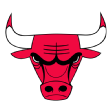
9. Chicago Bulls
Biggest mistake: Trading for Nikola Vucevic (2021)
The Bulls` biggest mistake this decade might be a broader strategic one, as they`ve consistently aimed for the middle of the standings rather than embracing the tank-and-rebuild cycle employed by most NBA teams with little hope of contention. However, Chicago`s stagnation began with the Vucevic trade, the first major move of lead executive Arturas Karnisovas` tenure, which sent Wendell Carter Jr. and two future first-round picks – both of which landed in the lottery – to Orlando in exchange for Vucevic.
Vucevic is a competent player, a two-time All-Star who was in the midst of a career season in Orlando when he was traded. But due to his defensive limitations, there`s a clear ceiling for a team built around Vucevic in the middle, so his acquisition symbolizes the Bulls` broader lack of ambition. Indeed, Chicago achieved a total of only one playoff win with the trio of Vucevic, DeMar DeRozan, and Zach LaVine.
Meanwhile, Orlando utilized the first of its extra draft picks on Franz Wagner, who would have been the best young player in Chicago since Jimmy Butler. (The second extra pick was used for Jett Howard, previously discussed as a major mistake for the Magic.)
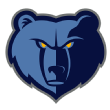
8. Memphis Grizzlies
Biggest mistake: Trading for Marcus Smart (2023)
After consecutive seasons with over 50 wins and the No. 2 seed, the Grizzlies sought the final piece they believed would elevate them to true championship contention. They targeted Marcus Smart, a Defensive Player of the Year who played in the NBA Finals with the Celtics, and paid a hefty price to pair him with Ja Morant in the backcourt: two first-round picks and Tyus Jones, arguably the league`s top backup point guard.
But as the rest of the Grizzlies` rotation was hampered by injuries and suspensions, Smart became part of the problem rather than a solution. He played just 39 games in 1½ seasons with the Grizzlies before they traded him – using a third first-round pick to offload his contract – at the 2025 deadline. According to VORP (value over replacement player), Smart provided precisely zero value over a replacement player during his time in Memphis.
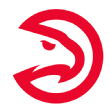
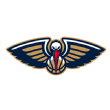
7. Atlanta Hawks
Biggest mistake: Trading for Dejounte Murray (2022)
6. New Orleans Pelicans
Biggest mistake: Trading for Dejounte Murray (2024)
First things first: It`s not Dejounte Murray`s fault he has been the subject of two of the worst trades of the decade. He`s a one-time All-Star and All-Defensive honoree.
However, we`re grouping these two moves because of his unfortunate transaction tree.
First, the Hawks, seeking a backcourt partner for Trae Young and hoping to rekindle the magic that propelled them to a surprising conference finals berth in 2021, acquired Murray from the Spurs in exchange for three future first-round picks and a pick swap. One of those picks (via the Hornets) did not end up conveying, but the Spurs landed Carter Bryant (the No. 14 pick last month) from this deal, and they still control the Hawks` unprotected picks in 2026 and 2027.
In his first season with the New Orleans Pelicans, Dejounte Murray played in only 31 games due to injury.
Despite that high cost, Murray did not bring Atlanta any closer to contention. The Hawks did not finish with a winning record in either season that Murray was on the roster, and lineups featuring Young and Murray playing together were outscored in both years.
Atlanta`s saving grace is that New Orleans made an even more lopsided trade for Murray just two years later, acquiring the All-Star guard in exchange for Dyson Daniels and two first-round picks (one of which the Hawks dealt in the Kristaps Porzingis trade, the other set to convey in 2027).
If that deal were simply a straight-up swap of Murray for Daniels, Atlanta would have clearly won. Murray tore an Achilles as the Pelicans finished 21-61 last season, while Daniels, who is seven years younger, won the Most Improved Player award and finished as the Defensive Player of the Year runner-up. The fact that the Pelicans also surrendered two first-round picks only exacerbates the negative perception of their side of the trade.
Tier 1: Franchise-Altering Terrible Trades
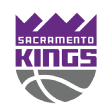
5. Sacramento Kings
Biggest mistake: Having Tyrese Haliburton and De`Aaron Fox, then losing them both within three years (2022 and 2025)
The Kings faced an enviable dilemma in 2022: with 24-year-old De`Aaron Fox and 21-year-old Tyrese Haliburton, they possessed two promising young point guards on the roster. They needed to decide whether to build around one or both. They chose one, and they chose incorrectly, with the shocking swap of Haliburton for Domantas Sabonis.
For a period, this deal appeared to be a win-win situation, as Haliburton blossomed in the Pacers` backcourt while the Fox-Sabonis duo propelled the Kings to the NBA`s best offense and the West`s No. 3 seed in 2022-23. This marked the franchise`s first playoff appearance in 17 years.
But Sacramento`s “light the beam” era was short-lived. After a seven-point loss to the Pelicans, the Kings missed the playoffs in 2023-24, then traded a disgruntled Fox in 2024-25 and missed the playoffs again.
Just a couple of years after their most successful run in decades, the Kings once again possess an ill-fitting roster with no clear direction, having gone from two promising point guards to none. Meanwhile, Haliburton led the Pacers to the Eastern Conference Finals and Game 7 of the NBA Finals in consecutive years, establishing himself as one of the league`s top passers and clutch scorers in the process.
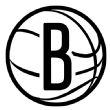
4. Brooklyn Nets
Biggest mistake: Trading for James Harden (2021)
There are so many `what-ifs` that could have transformed the James Harden trade from a debacle into a triumph. What if Harden and Kyrie Irving hadn`t been injured in the 2021 postseason? What if Kevin Durant`s foot hadn`t touched the 3-point line when he tied Game 7 against the Milwaukee Bucks with a turnaround jumper? What if Irving hadn`t refused the COVID-19 vaccine, bringing the Nets` three-star experiment to an abrupt halt?
But all of those `what-ifs` went awry, and the Harden trade did as well. In exchange for 1½ drama-filled seasons, replete with more hypothetical wins than actual ones, the Nets traded Jarrett Allen, Caris LeVert, three first-round picks, and four pick swaps (two of which ultimately weren`t exercised).
Houston has already leveraged its generous return to draft Tari Eason and Reed Sheppard, and to facilitate the trade for Kevin Durant from the Suns. More is yet to come; in a subsequent deal, the Nets even had to give Houston more picks to reclaim some of their original selections, once they realized the Durant-Harden-Irving era was over and they needed to embark on a tanking strategy.
Adding insult to injury, when Harden demanded a trade in 2022 and the Nets acquiesced by sending him to Philadelphia, the centerpiece of their return was Ben Simmons, who never recaptured the two-way value that earned him All-NBA honors in 2020. Simmons averaged 16 points per game during his tenure as a 76er, compared to just 6.5 points per game during his sporadic periods of availability with the Nets.
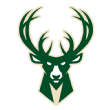
3. Milwaukee Bucks
Biggest mistake: Trading for Damian Lillard (2023)
Perhaps more than any other transaction on this list, the Bucks` trade for Damian Lillard seemed astute at the time. They desperately needed a shakeup after a shocking 8-over-1 upset loss to the Heat in the 2023 playoffs, their offense required an upgrade, and Lillard appeared to be a perfect complement to Giannis Antetokounmpo – who signed an extension soon after the Bucks traded Jrue Holiday (who was rerouted to Boston, where he won a title), Grayson Allen, a future first-round pick, and two pick swaps in exchange for Lillard.
However, two main issues meant the Bucks not only failed to contend for another title with Lillard aboard but didn`t win a single playoff series. The first issue was that even when both players were healthy, Lillard and Antetokounmpo didn`t seamlessly mesh in practice as well as they did in theory. The two future Hall of Famers ran only 20.2 pick-and-rolls per 100 possessions, according to GeniusIQ, which ranked a mediocre 46th out of 83 pick-and-roll combinations over the past two seasons (minimum 500 total picks).
The second problem was that neither player remained consistently healthy when it mattered most (with apologies to the Bucks` NBA Cup triumph). Antetokounmpo missed all of the 2023-24 postseason, while Lillard missed parts of both the 2023-24 and 2024-25 playoffs, the latter due to an Achilles tear that prematurely ended his Bucks tenure.
Months after his injury, the Bucks made the surprising decision to waive and stretch the remainder of Lillard`s contract to create the necessary cap space to sign free agent center Myles Turner. But now the Bucks have an annual $22.5 million cap charge for Lillard through 2029-30, and they do not control their first-round pick until 2031.

2. Phoenix Suns
Biggest mistake: Trading for Kevin Durant and Bradley Beal (2023)
Mat Ishbia officially assumed controlling interest as Phoenix`s new owner on February 7, 2023. Just over 24 hours later, the Suns traded for Kevin Durant. So-called `new owner syndrome` had never before manifested so rapidly: Ishbia pushed his team to relinquish a massive haul for Durant – Mikal Bridges, Cam Johnson, Jae Crowder, four unprotected first-round picks, and a pick swap – setting in motion a chain of events that have all but wrecked a team that reached the NBA Finals in 2020-21 and won a league-best 64 games in 2021-22.
It wasn`t merely the Durant trade that was the problem; it was the Suns` unwavering insistence on doubling down repeatedly, mortgaging every aspect of their future for increasingly long odds of winning in the present. That summer, Phoenix traded Chris Paul for Bradley Beal, who possessed a no-trade clause and more than $200 million remaining on his contract.
In their last season together on the Phoenix Suns, Kevin Durant and Bradley Beal averaged 26.6 and 17.0 points, respectively.
The total cost for Durant and Beal, factoring in the extra picks that Brooklyn and Washington acquired when they rerouted Bridges, Johnson, and Paul, amounted to 12 first-round picks and six pick swaps, plus by far the most expensive roster in the NBA and extraordinary penalties imposed by the second apron.
And the reward for all that aggressive spending? A second-round playoff loss in Durant`s first season, a first-round sweep in his second (Beal`s first), and an 11th-place finish in the West last season.
Now Durant has been traded away for much less than what brought him to Phoenix; Beal has been bought out and stretched, and will count $19.4 million against the Suns` cap for the next half-decade; and the Suns do not control their first-round pick until 2032. No franchise in the NBA is in a worse long-term situation than Phoenix.
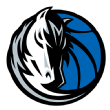
1. Dallas Mavericks
Biggest mistake: Trading for Kristaps Porzingis (2019) and trading for Kyrie Irving (2023)
The Dallas Mavericks` biggest mistake isn`t a single transaction but a consistent pattern of mismanagement in their attempts to find a co-star for Luka Doncic. While the article focuses on the 2020s, the roots of their current predicament stem from the Kristaps Porzingis trade in 2019, which, though technically outside our 2020-present scope, set the stage for subsequent errors.
The Porzingis trade, while initially promising, ultimately hampered the Mavericks` flexibility and long-term asset accumulation. They traded two first-round picks, Dennis Smith Jr., DeAndre Jordan, and Wesley Matthews for an injury-prone big man whose fit with Doncic was often questioned. When Porzingis failed to live up to expectations, the Mavericks found themselves in a bind.
This led to the subsequent, and more impactful within our timeframe, error: trading for Kyrie Irving in 2023. Desperate to find another All-Star to pair with Doncic, the Mavericks sent Spencer Dinwiddie, Dorian Finney-Smith, a first-round pick (which became Dereck Lively II for the Thunder after a reroute), and two second-round picks to the Brooklyn Nets for Irving. This move was made despite Irving`s well-documented history of locker room issues and erratic availability.
The pairing of Doncic and Irving never truly clicked in the way Dallas hoped, leading to defensive vulnerabilities and inconsistent play. The Mavericks continued to struggle for consistent success, often relying solely on Doncic`s individual brilliance. The cost of these decisions, particularly the loss of valuable draft capital and role players, significantly limited their ability to build a well-rounded roster around their superstar.
While the Mavericks have recently seen some playoff success, often carried by Doncic`s MVP-caliber play, the long-term ramifications of these trades, especially the depleted draft cupboard and the massive financial commitments, represent the most damaging sequence of roster mistakes in the NBA this decade, hindering their ability to build a sustained championship contender.






